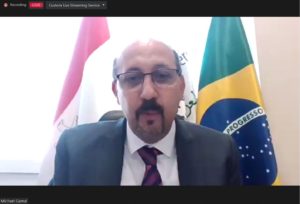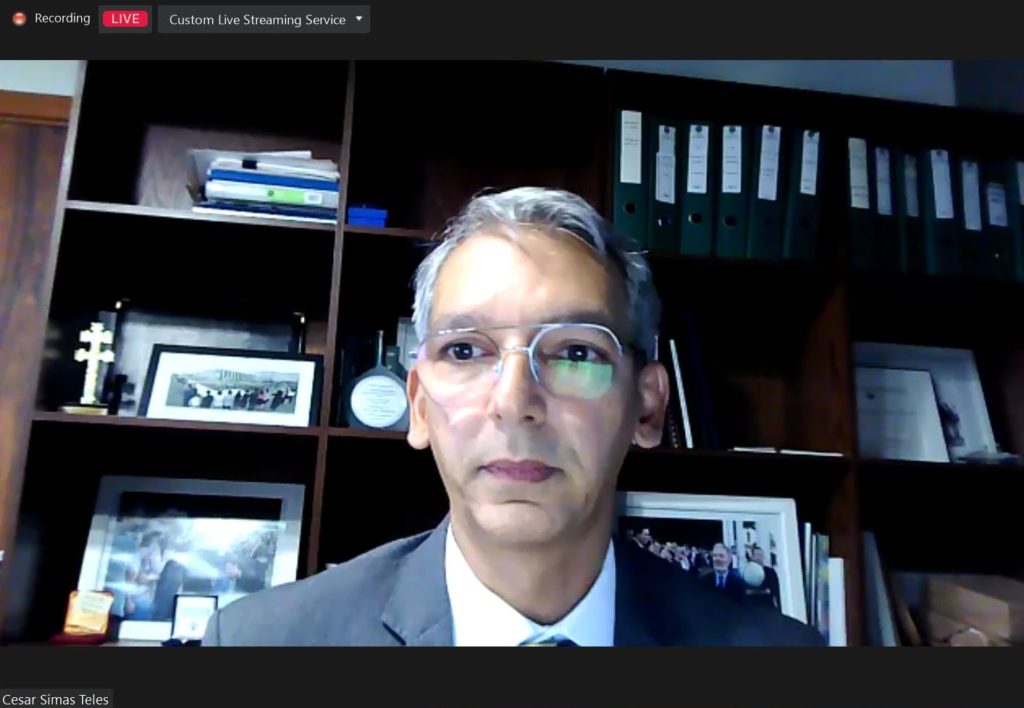São Paulo – Egypt has approved a series of measures over the last years that impacted the country’s foreign trade, including exports to its market. Some of the changes were presented to Brazilian businesspeople by the agricultural attaché of the embassy of Brazil in Egypt, Cesar Simas Teles (pictured above), in the panel’ Regulatory and Business Environment’ in an online event on the Egyptian processed food industry held by the Brazilian Food Industry Association (ABIA) and the Arab Brazilian Chamber of Commerce (ABCC) this Tuesday (13).

Teles described measures taken since he took over as agricultural attaché in 2019. One of the latest was the requirement to issue letters of credit for Egypt to import. “It’s a step forward for the exporter who’ll be guaranteed to get paid once the good is delivered,” he said. Teles added that the issuances had taken a long time since the banking network was not ready to meet all the demand. Still, the Egyptian government is working to normalize the situation, which is expected to occur in the following months.
A 2016 decree aimed at controlling piracy issues has also been updated. It affects, for example, own brand food products sold to Egypt, whose brand and plant must be registered to enter the local market. According to Teles, this used to take long, but the government has recently updated its legislation and tried to fast-track the process, so applicants can receive the registration within 15 to 21 days after the necessary documentation is presented.
The attaché also mentioned the creation of the National Single Window for Egyptian Trade Across Borders (NAFEZA) by the government, which has centralized the trade documentation, including the use of blockchain to cut customs clearance costs and time. Egypt is also accepting the delivery of documentation before the ship docks in Egypt with the cargo. “If it has some sample in case of foods, the local authority will be ready to collect the sample and analyze it,” he said.
Another measure mentioned by the attaché was the establishment of the National Food Safety Authority (NAFSA), the Egyptian agency consolidating food legislation and inspection. According to Teles, it was created in 2017 and worked hard over the last few years to develop a legal framework for the industry. In 2019, the government decided to solely accept halal certifications issued by IS EG Latin America for exports from Brazil to Egypt. The same model has been adopted for other world regions.
Expanding market
In addition to updating the Brazilian exporters on the regulations, the attaché also talked about the current economic context the country is going through and the potential he sees in trade with Brazil. He pointed out that from 2019, when he arrived in the Arab country, until now, the Egyptian population went from 97 million to 105 million. “Eight million new Egyptians, eight million mouths,” he said, giving a glimpse into this expanding market.

In this segment, Teles sees an opportunity for Brazil to advance as a supplier in several sectors. Regarding protein, Brazilians mainly supply whole poultry to Egypt, and he sees it is also possible to sell cuts and prime beef. Currently, Brazil exports mainly forequarter beef cuts to the Egyptian market. The attaché also told of the notoriety Brazilian coffee has locally and called on business people in the sector to turn it into good business opportunities. Teles also mentioned other sectors he sees as promising for Brazilian exports, such as fresh and frozen fruits, dairy and byproducts, sesame, maize, and processed products such as sweets, panettone, soft drinks, and guarana syrup.
The regional director and head of the ABCC’s Cairo office, Michael Gamal, informed Brazilian businesspeople how the office could help them in all three phases of trade with Egypt, from preparation to sales itself and post-trade. The executive said in pre-trade, for example, the office can support the business community with information on Egyptian needs, local preferences, required processes, and packaging, among others.
Productive investment
The legal advisor to the CEO of the General Authority for Investments and Free Zones of Egypt (GAFI), Amr Noureldin, gave Brazilians an overview of the economic advancements in his country and demonstrated its desire to attract investments from Brazil in the productive sector, taking advantage of trade agreements the Arab country has in force with different regions of the world. According to Noureldin, Brazil is one of the most important countries for Egypt in terms of foreign direct investment. “We are looking to attract more Brazilian investment,” he said.
Noureldin spoke of the Gross Domestic Product (GDP) growth achieved by Egypt in recent years and the good prospects in this regard, increasing population, attractiveness for foreign investments, young age of local consumers, decreasing unemployment rate after the latest reforms, highlighting oil and gas production, trade agreements with regions such as the European Union and Africa, the importance of the Suez Canal, port sector size, and incentives for different areas in the country, among others.
The event’s purpose was to provide Brazilian business people with an overview of the industrialized food market in Egypt. In addition to the panel on the regulatory environment, there was a panel on opportunities in the food and beverage sector and an opening with speeches by leaders from both regions, such as ABCC president Osmar Chohfi, ABIA’s chief executive João Dornellas, and Egyptian commercial consul to São Paulo, Nashwa Bakr. About 250 people followed the event in Brazil and abroad via Zoom and YouTube.
More on the event coming soon
Translated by Guilherme Miranda & Elúsio Brasileiro




